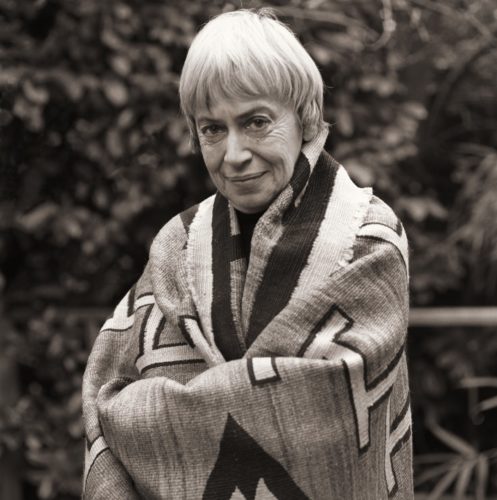
Photograph by Dana Gluckstein / MPTV Images, from “The Subversive Imagination of Ursula K. LeGuin,” The New Yorker, January 23, 2018
I have been terribly blue these past few days over the news that Ursula LeGuin has passed out of this world. I came to know Ursula in the 1980s, when we lived a few houses apart in Portland, Oregon. We had a mutual (and mutually dear) friend in Andrea Carlisle, and we connected initially through our love of cats. We each had male cats of extraordinary character – Ursula’s Lorenzo, Andrea’s Max, and my Abraham – and soon we imagined a newspaper that they produced, The Cat News, “By Cats, For Cats, and About Cats.” Abraham, a big snowshoe Siamese, would be its major sponsor, with his product Kitty Pristine, the Paw Whitener for Cats. Cats loved Ursula and if she came to visit, Abraham made a beeline for her lap, where he was received with satisfying enthusiasm.
One time I invited Ursula and some other friends to dinner. I was preparing clam linguine, and everything was ready except for the clams. Just as I started to cook them, my stove threw out a huge spark and died. What to do? Ursula, ever resourceful, suggested that we toss the clams in the coffee maker and run a cycle, which we did, and the clams came out to perfection.
A few years ago, I wrote Ursula with a literary question. I had just lost a friend, and in my sorrow I was reaching for a line I could not quite place where a character said, after a death, something to the effect of “No one will ever call me _________ again.” Vague as my recollection was, the line captured for me the particularity of loss, that part of us that is cleaved away when someone with whom we have shared a part of our life is no longer with us. The line was familiar to Ursula, but she, too, could not place it.
A few years later, I wrote her again. I had been watching the BBC adaptation of Elizabeth Gaskell’s 19th Century novel Cranford, and Miss Matty, upon losing her sister Deborah, said, “No one else will ever call me Matilda again.” But I had misremembered the context. Deborah had insisted others call Matty Matilda as a preference for formality; Matty’s comment didn’t represent the memory of a fond sobriquet she would never hear again so much as the passing of a certain imperiousness. Ursula wrote back with her own memories of the book and then added, “I think what touches me about the sentence as you remembered it, is that I thought of it as someone thinking of a nickname from childhood. I lost a brother last year and I think sometimes of tiny things, references that only he and I would understand, from growing up together. Nobody else will ever understand them. It’s a twinge.”
I did not know Ursula well. Over the course of 30 years, we had probably no more than a couple of dozen interactions. And yet they were particular and memorable, and if I may venture, infused with love. Ursula once told her biographer, Julie Phillips, that she had “a knack for home life,” something I expect helped her balance her natural introversion with her fame. She also had a knack for friendship. Ursula’s fierce intelligence and unparalleled imagination, her insight and her courage are her legacy to the world at large, preserved in more than 50 books of fiction, poetry, criticism, essays, and translation. But for those of us who knew her-her family, her close friends, and even the legion of us who played a much more peripheral role in her life-her legacy is her great heart. Which is what is making me feel so blue. No one will ever cook clams in my coffee maker again.
The Writer on, and at, Her Work, by Ursula K. LeGuin
Long ago when I was Ursula
writing, but not “the writer,”
and not very plural yet,
and worked with the owls not the sparrows,
being young, scribbling at midnight:
I came to a place
I couldn’t see well in the darkness,
where the road turned
and divided, it seemed like,
going different ways,
I was lost.
I didn’t know which way.
It looked like one roadsign said To Town
and the other didn’t say anything.
So I took the way that didn’t say.
I followed
myself.
“I don’t care,” I said,
terrified.
“I don’t care if nobody ever reads it!
I’m going this way.”
And I found myself
in the dark forest, in silence.
You maybe have to find yourself,
yourselves,
in the dark forest.
Anyhow, I did then. And still now,
always. At the bad time.
When you find the hidden catch
in the secret drawer
behind the false panel
inside the concealed compartment
in the desk in the attic
of the house in the dark forest,
and press the spring firmly,
a door flies open to reveal
a bundle of old letters,
and in one of them
is a map
of the forest
that you drew yourself
before you ever went there.
The Writer At Her Work:
I see her walking
on a path through a pathless forest,
or a maze, a labyrinth.
As she walks she spins,
and the fine thread falls behind her
following her way,
telling
where she is going,
where she has gone.
Teling the story.
The line, the thread of voice,
the sentences saying the way.
The Writer On Her Work:
I see her, too, I see her
lying on it.
Lying, in the morning early,
rather uncomfortable.
Trying to convince herself
that it’s a bed of roses,
a bed of laurels,
or an innerspring mattress,
or anyhow a futon.
But she keeps twitching.
There’s a *lump*, she says.
There’s something
Like a *rock*—like a *lentil*—
I can’t sleep.
There’s something
the size of a split pea
that I haven’t written.
that I haven’t written right.
I can’t sleep.
She gets up
and writes it.
Her work
is never done.
Some tributes to Ursula:
“The Subversive Imagination of Ursula K. LeGuin” by Louisa Phillips in the The New Yorker
“Ursula K. LeGuin: One of the literary greats of the 20th century,” by Margaret Atwood in The Guardian, January 24, 2018
“Ursula K. LeGuin didn’t want to be called a ‘genius,” by Karen Joy Fowler, The Washington Post, January 23, 2018

I love your site. I found the poem by Ursula Le Guin utterly fantastic. It filled a space, a longing.
This is such a hard time with crevices available rather then receptive and generous spaces for creativity.
I would like to follow your various activities a propose a zoom some time. I rethinking the paradigm of audience and
Engagement. I found out about you from your Yale class of 77 page. I am a fellow classmate. I will Share this poem with Linn Cary Mehta, a fellow writer and Yalie.
Warmly,
Pam